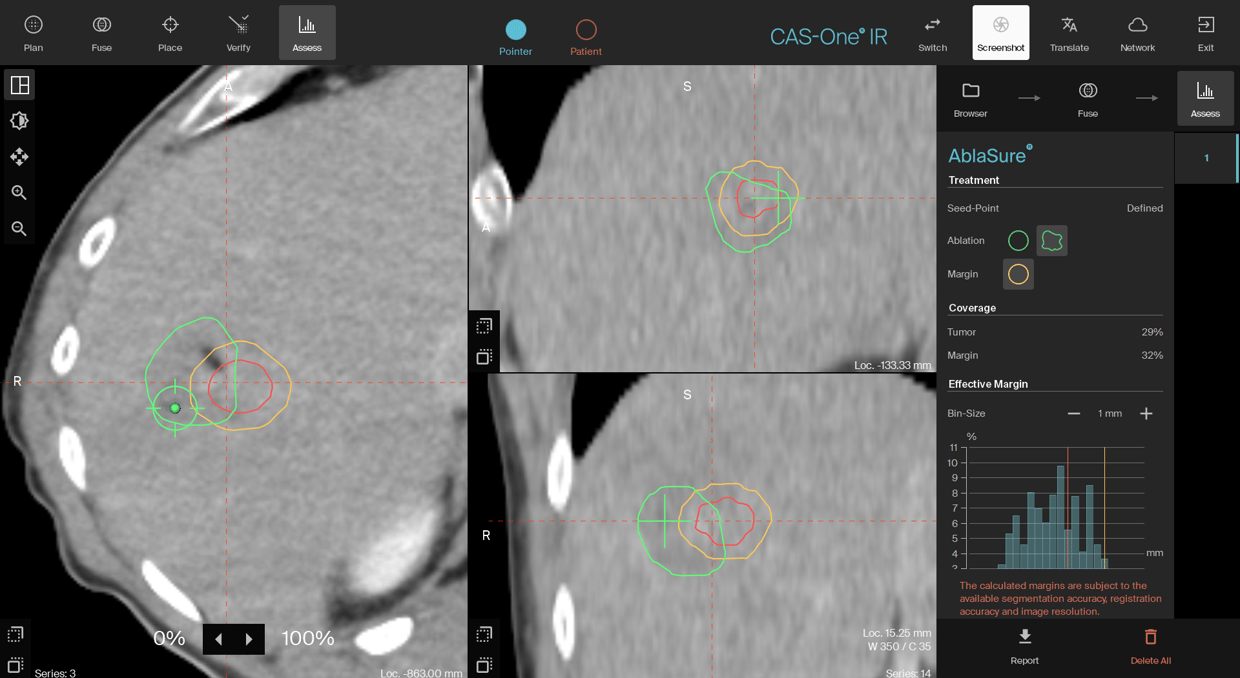Immediate reablation in a single MWA in segment VI
A 41 year-old patient diagnosed with colon cancer in October 2023 had a single hepatic metastases discovered in June 2024, which was subsequently treated by MWA. Due to the probable heat-sink effect of the hepatic vein, neither the tumor nor the safety margin were covered enough. This was clearly seen with the AI-driven AblaSure of CAS-One IR. It was therefore an easy decision to do a second MWA on the missed portion immediately thereafter. The second treatment was successful and still showed complete coverage at the 1-month follow-up.
 Planning scan fused with the diagnostic series to assess the situation of the lesion within the hepatic vein.
Planning scan fused with the diagnostic series to assess the situation of the lesion within the hepatic vein.
 3D reconstruction of the planning scan showing the proximity to the hepatic vein
3D reconstruction of the planning scan showing the proximity to the hepatic vein

First treatment result showing an incomplete ablation with only 29% of the tumor covered and 32% of the margin.
After the reablation, AblaSure shows 100% tumor and 98% margin coverage likely due to direct contact with the hepatic vein.
Name: Dr. Ghizlane TOUIMI BENJELLOUN
Institution: University Hospital of Nîmes, FRANCE
Patient age and sex: Male, 41 years old
- Initially diagnosed with Colorectal cancer in October 2023
- Diagnosed at the same time with an aortic stenosis
- Treated in November 2023 with an aortic bioprothesis
- January 2024 patient had resection of the colon tumor: pT2, N1b, R0
- In March 2024, a single hepatic metastases appeared on the CT (before chemo). Patient is contraindicated for MRI due to abdominal metallic residues
- June 2024, new sole lesion in the liver after 3 cycles of chemo
- Tumor board decided on MWA treatment before 5 "adjuvant" cycles of chemo
- Patient was under general anaesthesia and High-Frequency Jet-Ventilation
- Planning CT was fused with an earlier diagnostic CT to confirm the visibility of the tumor and its situation with the hepatic vein
- MWA was performed with the Medtronic Emprint system
- AblaSure showed a clearly incomplete treatment likely due to the heat-sink effect from the hepatic vein
- Decision was made to retreat immediately the patient while still under general anesthesia
- AblaSure enabled a satisfying treatment of this patient showing that CAS-One IR is not only indicated for complex cases. Margin assessment is essential in every ablation treatments unrelated to the complexity of the trajectory
- 1-month follow-up CT showed complete ablation
- At first sight, this treatment of a small lesion surrounded by vessels but not encased in them seemed pretty straight forward. This case showcases perfectly how CAS-One IR is not only justified for challenging trajectories but also for every day ablations that are always depending on the patient and not only on a good planning
- Department head Prof. Julien Frandon said about the case: "We chose to implement CAS-One IR for its AI-guided precision which reduces recurrence rates and ensures optimal patient care as shown in this example."


